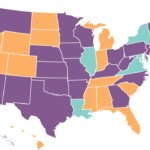“This type of arrangement has the potential to improve the quality, value and efficiency of drug-based treatments,” Michigan Department of Health spokesman Bob Wheaton said in an email.
Colorado’s Department of Health Care Policy and Financing said it is in the “early planning stages” of a request to pursue value-based Medicaid drug purchasing contracts.
SAVINGS TBD
To be sure, it remains unclear how much money these new value-based programs will save, and whether enough drugmakers will get on board since their participation is voluntary. Oklahoma is working with the University of Oklahoma to study whether the new contracts save money over time.
The state has yet to secure agreements for treatments that take up a major portion of its $650 million in Medicaid spending, such as attention deficit/hyperactivity disorder therapies for children.
In the meantime, the biggest hurdle is just finding pharmaceutical companies that are willing to work with the state, Nesser said. “Mostly we are talking to smaller companies.” Approaches to cancer drugmakers in particular have so far led nowhere: “We got the door slammed in our face,” Nesser said.
Industry trade group Pharmaceutical Research and Manufacturers of America said it supports Medicaid efforts to use value-based contracting for new medicines, but said states need to make sure patients still have access to current prescriptions.
Smaller companies, particularly those with newer drugs, may have more of an incentive to use such deals as a lever against large rivals.
Alkermes’ sales of Aristada totaled $93.5 million last year, dwarfed by the $3 billion in sales for Johnson & Johnson’s long-acting antipsychotics including Risperdal Consta (risperidone) and Invega Sustenna (paliperidone palmitate).
The new Medicaid agreement in Oklahoma may help Alkermes in its sales pitch to doctors, including for Aristada Initio – approved last month as the first antipsychotic injection that does not require patients to begin treatment by taking oral pills for several weeks.
Nesser said other rebates under negotiation would be structured differently than the Alkermes deal. They could link the price of a drug to its impact on other costs, such as emergency room visits and hospitalizations, or give higher-rebate products preferential status over similar treatments.

